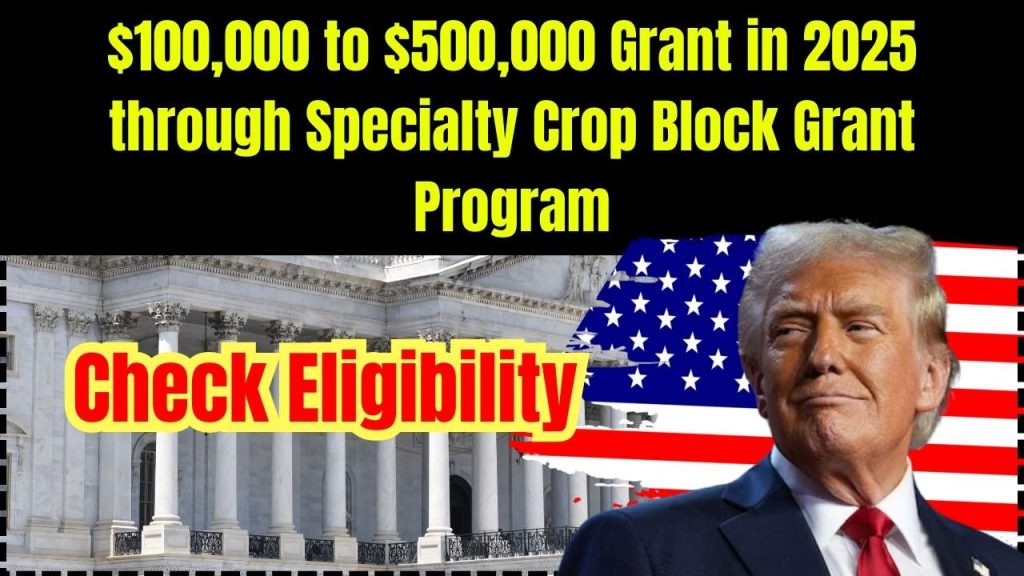
$100,000 to $500,000 Grant in 2025 through Specialty Crop Block Grant Program: The Specialty Crop Block Grant Program (SCBGP) is a federal initiative designed to support the production, research, and marketing of specialty crops. For 2025, grants ranging from $100,000 to $500,000 are available, providing a significant financial opportunity for farmers, researchers, nonprofits, and other stakeholders in the specialty crop industry. Whether you’re looking to innovate, expand your market, or improve sustainability, this program can help you achieve your goals. Let’s explore what SCBGP is, who qualifies, how to apply, and how you can maximize your chances of success.
$100,000 to $500,000 Grant in 2025 through Specialty Crop Block Grant Program
The Specialty Crop Block Grant Program 2025 is a remarkable opportunity to secure funding for projects that enhance the specialty crop sector. With grants ranging from $100,000 to $500,000, this program can empower farmers, nonprofits, and researchers to innovate, promote sustainability, and strengthen markets. Whether you’re looking to improve production, conduct research, or launch a marketing initiative, this grant can be your springboard to success. Don’t miss this chance to make a lasting impact in 2025. Start preparing your application today!
| Feature | Details |
|---|---|
| Grant Range | $100,000 – $500,000 |
| Purpose | Support production, research, marketing, and promotion of specialty crops |
| Eligible Crops | Fruits, vegetables, nuts, herbs, spices, nursery crops, and floriculture |
| Who Can Apply? | Farmers, nonprofits, research institutions, tribal governments, state agencies, and universities |
| Focus Areas for 2025 | Climate-smart agriculture, pest management, food safety, market access, and innovative practices |
| Application Deadline | Varies by state—check your state’s Department of Agriculture website |
| More Info | Official USDA Website |
What is the Specialty Crop Block Grant Program (SCBGP)?
Launched under the Farm Bill, the SCBGP is overseen by the U.S. Department of Agriculture (USDA). It funds projects aimed at improving the competitiveness and sustainability of specialty crops.
These crops include:
- Fruits: Apples, berries, melons, etc.
- Vegetables: Tomatoes, peppers, leafy greens, and more.
- Tree Nuts: Almonds, walnuts, pistachios.
- Herbs and Spices: Mint, basil, ginger, and others.
- Nursery Crops: Trees, shrubs, flowers, and sod.
Specialty crops are vital to the U.S. economy and health, contributing to over $20 billion in annual exports, generating jobs, and diversifying our food supply. The SCBGP supports growers and stakeholders by funding initiatives that improve production, enhance market access, and promote innovation.
Why Apply for the Specialty Crop Block Grant Program?
If you’re in the specialty crop sector, this program offers:
- Access to Funding: Grants up to $500,000 can transform your operations.
- Focus on Innovation: Supports climate-smart practices, food safety, and cutting-edge research.
- Diverse Opportunities: Open to farmers, nonprofits, universities, and tribal governments.
- Community Impact: Projects often create local jobs, promote sustainability, and enhance food security.
Who is Eligible for SCBGP Grants?
Eligible Applicants
The program is open to a wide range of stakeholders:
- Farmers and Growers: Growers of specialty crops can apply to improve operations, explore new markets, or implement sustainable farming practices.
- Nonprofits and NGOs: Organizations supporting farmers or promoting specialty crops can apply for education and outreach initiatives.
- Research Institutions: Universities can propose research on pest management, water efficiency, or other challenges faced by specialty crops.
- State and Tribal Governments: These entities can propose programs that benefit local specialty crop growers.
Eligibility Criteria
- Your project must exclusively benefit specialty crops as defined by the USDA.
- Applicants must demonstrate alignment with the program’s objectives.
- Projects must deliver measurable benefits to the community or industry.
Focus Areas for 2025
For the 2025 funding cycle, priority will be given to projects focusing on:
- Climate-Smart Agriculture: Reducing carbon footprints and improving resilience.
- Food Safety: Meeting the latest federal standards for specialty crops.
- Market Development: Expanding domestic and international markets.
- Innovative Practices: Research and adoption of new technologies or methods.
How to Apply for the $100,000 to $500,000 Grant in 2025 through Specialty Crop Block Grant Program?
Applying for the grant involves several key steps:
1. Review Your State’s Guidelines
Each state manages its SCBGP funding, so guidelines vary. Visit your state’s Department of Agriculture website for specific priorities and deadlines.
2. Develop a Strong Proposal
Your project proposal is critical. It should include:
- Objectives: Clear, measurable goals.
- Budget: A detailed breakdown of how funds will be used.
- Expected Outcomes: Metrics for success.
- Relevance: How your project aligns with SCBGP priorities.
3. Submit Your Application
Applications are submitted through your state’s designated platform. Include all required documents and adhere to formatting guidelines.
4. Follow Up
Some states require interviews or additional documentation. Stay proactive in communicating with your state agency.
Success Stories: How SCBGP Grants Are Making a Difference
- Sustainable Pest Control: A research project funded by SCBGP helped a California farm reduce chemical pesticide use by 40% through innovative biological controls.
- Promoting Local Produce: A nonprofit used grant funds to launch a marketing campaign for Michigan-grown cherries, increasing local sales by 25%.
- Water Conservation: A grower in Arizona installed drip irrigation systems using SCBGP funds, cutting water usage by 30%.
Tips for a Winning Application
- Be Specific: Clearly outline how your project benefits specialty crops.
- Show Impact: Use data to demonstrate potential economic, social, or environmental benefits.
- Collaborate: Partner with local organizations or universities for a stronger proposal.
- Meet Deadlines: Late submissions are disqualified, so plan ahead.
No More Time Shifts? US Moves Forward on Changes to Daylight Saving Time!
U.S. Government Confirms No SSI Payments in January: Here’s the New Timeline
U.S. Retirees Rejoice: The News You’ve Been Waiting for Has Finally Landed!
Frequently Asked Questions (FAQs)
1. What are specialty crops?
Specialty crops include fruits, vegetables, tree nuts, herbs, spices, and nursery crops. A full list is available on the USDA website.
2. Can small farmers apply?
Absolutely. Small-scale farmers are encouraged to apply, particularly for projects involving sustainability or local market access.
3. Are matching funds required?
Some states may require matching funds or in-kind contributions. Check your state’s specific guidelines.
4. What is the application deadline?
Deadlines vary by state. Typically, applications open in early 2025 and close mid-year. Visit your state’s Department of Agriculture for details.
5. How are funds distributed?
Funds are usually distributed in stages, tied to project milestones.
Resources and Links
Here are some helpful links to get you started:
- Specialty Crop Block Grant Program – USDA Official Page
- List of Eligible Crops






